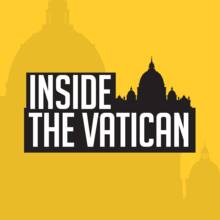As the first session of the Synod on Synodality in Rome draws to a close, its members have released a letter to “the people of God.” The letter is the first of two documents expected from the synod before it concludes its business in Rome on Oct. 29.
Veteran Vatican correspondent Gerard O’Connell joins host Ricardo da Silva, S.J., to discuss the letter which was released shortly before they recorded this “Inside the Vatican” episode on Oct. 25. “It’s really a covering letter,” says Ricardo, explaining that the “much more substantive” 40-page synthesis document—which will be voted upon and is expected to be released hours before the synod adjourns on Oct. 29—“will get into, we’re hoping, much more of the meat of the discussion; where there was agreement, where there were points of difference between synod delegates, and the questions that they’re hoping will be enlarged upon and discussed and studied.”
This first letter is merely “saying the synod has finished,” Gerry explains. “It’s saying, ‘Now it’s being passed to you, but it’s coming with a package, and that package hasn’t yet been delivered.’” And even though he is hopeful that the forthcoming synthesis will offer more substance than this initial letter, he cautions that this is not the end of the synod process, and that it will continue for at least another year. “Let’s not put too much weight on the expectations,” he says, “we know there’s a second half to play.”
[Listen and subscribe to “Inside the Vatican” on Apple Podcasts and Spotify.]
In the second half of the show, Gerry and Ricardo talk about the ongoing crisis in Israel and Gaza. Over the weekend, the pope spoke to President Biden on the phone about the war, the humanitarian crisis, the need for all the hostages to be released by Hamas, and the need for a ceasefire. Just as he has every Wednesday and Sunday, Pope Francis called for an end to the war the morning of Oct. 25, explains Ricardo. Gerry reflects on the “striking” way that “two major events in the history of the church, the Second Vatican Council—and now the big event, the Synod, that is implementing [Vatican II] in a fuller way, should be taking place in the midst of what the letter calls ‘the context of a world in crisis.’”
Lastly, as they were wrapping the recording, Ricardo and Gerry learned that Pope Francis had made a very strong intervention at the synod, “decrying institutionalized clericalism and recognizing the faith of the people of God,” Ricardo explains before offering a roughly-translated snippet of what the pope said:
“Clericalism is a whip. It is a scourge. It is a form of worldliness that tarnishes and damages the face of the Lord's spouse. It enslaves the holy faithful people of God.”
Links from the show
- Letter to the People of God
- As the synod’s first session closes, assembly addresses letter to the ‘people of God’
- Synod Diary: The synod isn’t hiding its disagreements. That’s a good thing.
- Synod Diary: What should the people of God expect from the Synod?
- Jesuitical Podcast: When Catholic doctrine can change—and when it can’t
- Synod Diary: Will synod members get to vote on the final document?
- Pope Francis wants the synod in every parish. Here’s how to bring it to yours.







